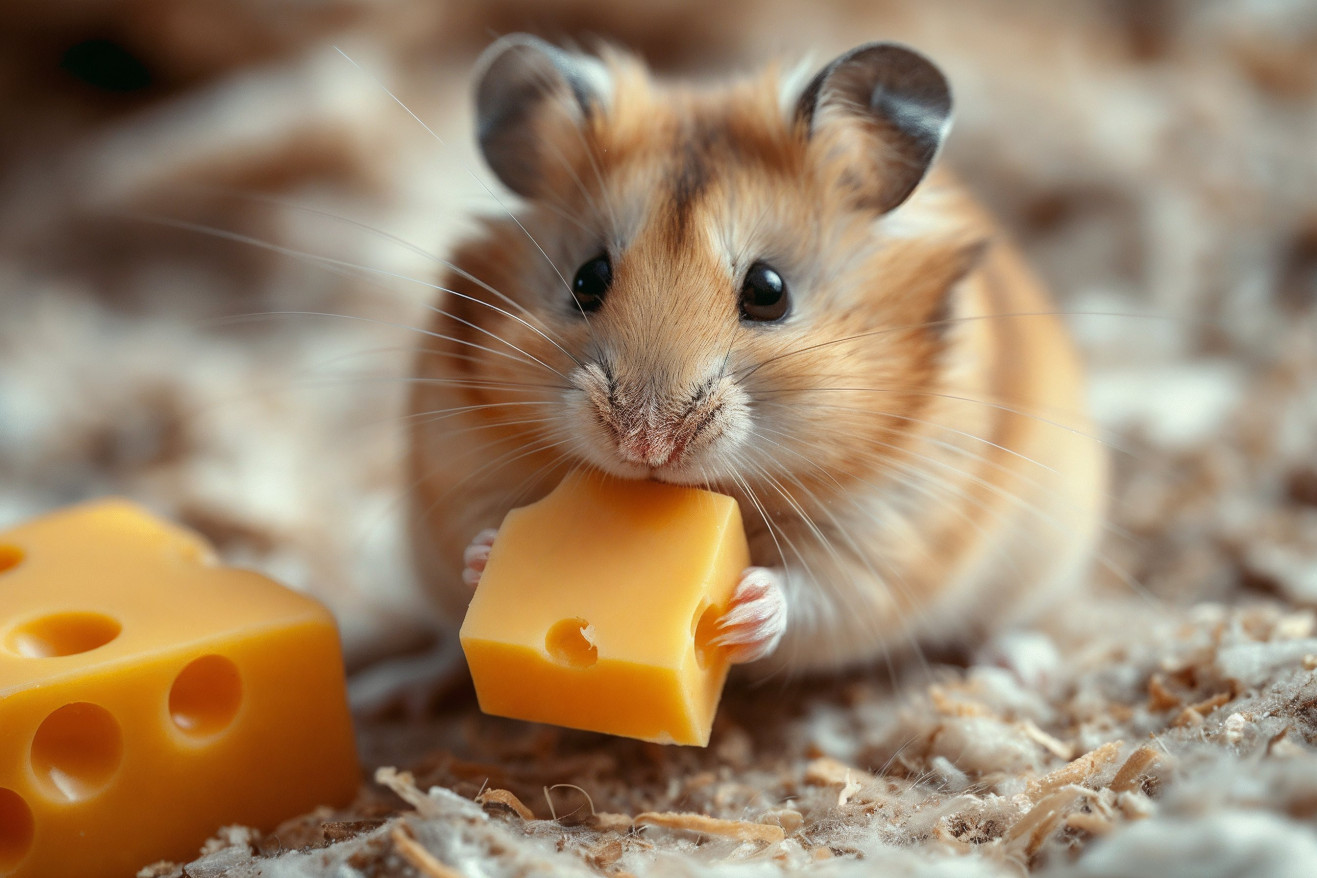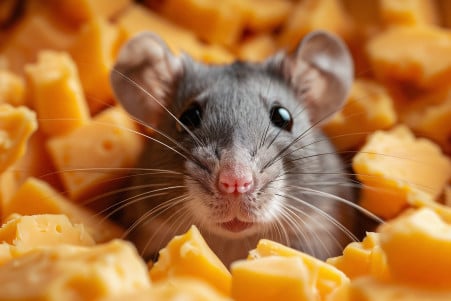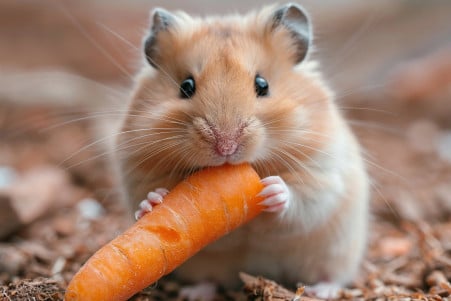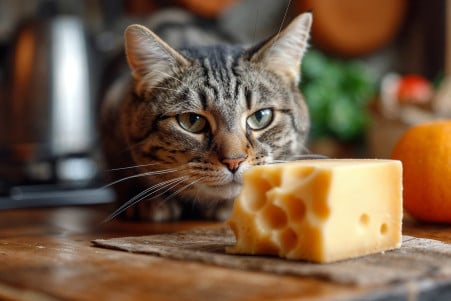Can Hamsters Have Cheese? What You Need to Know About Dairy
4 February 2024

If you have a hamster, you may be tempted to share a piece of cheese with them due to their adorable nature. However, hamsters can eat cheese in moderation as a special treat. That said, it’s important to stick to low-fat options like mozzarella and cottage cheese and avoid high-sodium and moldy cheeses.
You should also limit the amount you give them and how often you give it to them to prevent digestive upset and other health issues.
This article will explore the scientific literature on hamster dietary requirements and their ability to consume dairy, including cheese. It will draw on research from veterinary nutrition and animal behavior to offer a complete picture of the place of cheese in a hamster’s diet, as well as the benefits and drawbacks of feeding it to them. Armed with this information, you can make the best choices for your pet’s diet.
Can hamsters eat cheese?
How to Make Sure Cheese Is Safe for Your Hamster
Of course, when you’re thinking about giving your hamster a treat like cheese, you also have to think about the potential risks. While cheese can be a good source of protein, it’s also high in fat and sodium, which can cause problems like obesity and digestive upset.
To help prevent these issues, A-Z Animals says that cheese should be given in pea-sized portions no more than once a week. The type of cheese matters too, and it’s best to stick with low-fat and low-sodium options like mozzarella and cottage cheese.
On the other hand, high-fat, high-sodium, and moldy cheeses can all cause health problems.
The key to feeding cheese to your hamster is to do it in moderation. Animal Bliss says that you should limit cheese to no more than a quarter of an ounce per week to prevent renal failure and ensure that your hamster’s diet stays balanced.
Meanwhile, All Things Hamster recommends that you start by feeding your hamster small amounts of cheese and watching for any signs of digestive upset or intolerance.
Good cheeses to feed your hamster include low-fat cheddar and mozzarella, while blue cheese and processed cheese products are best avoided. By following these guidelines, you can make sure that cheese remains a fun treat for your hamster without causing any harm.
Hamster Metabolism and Diet
The metabolic rate of hamsters is an important consideration when determining their dietary requirements. A study by Anna S. Przybylska-Piech in the Journal of Comparative Physiology B shows that housing conditions, including the presence of running wheels, affect the basal metabolic rate (BMR) and energy expenditure of hamsters. This demonstrates the importance of taking physical activity into account when evaluating what hamsters should eat.
Because of their high metabolism, adding high-fat or high-salt foods like cheese to a hamster’s diet can have a big impact. A study by De-Hua Wang and colleagues published in PLOS ONE shows that the metabolic rate and thermogenesis in striped hamsters is impacted by ambient temperature, showing how important it is to get the balance between energy intake and energy expenditure right.
The high metabolism of hamsters makes them especially susceptible to obesity and diabetes when they’re given high-energy foods like cheese because even small amounts of extra energy can lead to weight gain.
Balancing nutrients is important for the health of hamsters. A look at what a balanced hamster diet looks like shows that while cheese can be a source of protein, it needs to be balanced with other nutrients and the animal’s natural diet. This knowledge should help pet owners make sure they’re giving their hamsters a range of snacks that are safe and good for them.
How to Create a Healthy Diet for Your Hamster
When creating a healthy diet for hamsters, it’s important to include nutrient-rich pellets that are similar to their natural diet and will help prevent selective eating, as suggested by Burgess Pet Care.
While cheese can be a good source of protein, it is also high in fat, which can lead to obesity and other health problems if hamsters eat too much of it. Instead, you should try to stick to treats that are more similar to the types of foods that hamsters would eat in the wild, like grains, seeds, nuts, roots, and fruits, according to PetHelpful.
Healthy treats can help improve the lives of hamsters by giving them some variety in their otherwise pellet-based diets. For example, the PDSA recommends adding some fresh vegetables, like carrots and broccoli, to your hamster’s diet to give them some variety without the fat content that cheese has.
Just make sure to give them small amounts of these extra treats so that they don’t disrupt the nutritional balance and so that their need for a complete diet is met.
It’s important to note that when you give your hamster these treat options, they should be used to supplement a complete and balanced diet, not replace it. By offering a range of options that are safe and healthy for your hamster, you can ensure that you’re providing the nutrition that they need while also supporting their natural foraging instincts.
Always remember that everything should be given in moderation and that the goal is to maintain your pet’s health and well-being.
Lactose Tolerance in Hamsters
One important factor to consider when feeding hamsters dairy products like cheese is how hamsters digest lactose. Lactose tolerance is determined by the presence of the enzyme lactase, which breaks down lactose.
A study published on PubMed by D. DiBattista found that adult golden hamsters have a high degree of lactose tolerance. This is in contrast to many adult mammals, which have low lactase levels and therefore prefer other sugars. Hamsters were able to consume large amounts of lactose without any negative side effects, suggesting they may have a higher tolerance for lactose than previously thought.
That said, lactose intolerance could still be an issue for some hamsters, causing gastrointestinal problems.
While it’s not clear why there is such a wide range of lactase activity between different species and individual hamsters, it is clear that tolerance levels could impact how a hamster responds to cheese.
While the study didn’t find any digestive health issues with lactose consumption, it’s still a good idea to watch for signs of intolerance. Because hamsters may be able to tolerate lactose, it may be safe to feed them cheese in moderation, but it’s important to watch for individual reactions and keep in mind the wide range of tolerance between species.
Hamster Diets Explained: What Hamsters Eat in the Wild and as Pets
In the wild, hamsters eat a diet that includes grains, seeds, roots, and insects, and their diet is based on the availability of these foods throughout the year. The International Fund for Animal Welfare explains that hamsters are small foragers that are good at finding food, and they take the food they find back to their burrows to eat later.
This means that it’s important to make sure that the diet of a pet hamster is based on the same nutritional principles.
When cheese is added to a hamster’s diet, it goes against the way that hamsters eat in the wild. According to Live Science, hamsters have very specific dietary needs, and the balance of protein and fat that they get from their diet is essential to their health. While cheese does provide protein, it doesn’t offer the same nutritional value as the other foods that hamsters eat in the wild.
By making sure that the food they give their hamsters is based on the animals’ natural foraging and hoarding behaviors, pet owners can help ensure that their hamsters are healthy both physically and mentally.
This means that even if they’re going to give their hamsters cheese as a treat, they should make sure that they only give it to them in small amounts that won’t throw off their natural diet balance from an ethological perspective.
This will help make sure that their hamsters’ diets are as varied and nutritious as they would be if they were living in the wild, which will help them feel more secure and comfortable.
Final Thoughts: Cheese and Your Hamster’s Health
In conclusion, the process of learning about hamsters and cheese leads to one main takeaway: moderation. While it is safe to feed hamsters low-fat, low-sodium cheeses like mozzarella and cottage cheese, it is important to only give them a little bit at a time to ensure their well-being. On the other hand, high-sodium cheeses and cheeses that have gone bad should be avoided because they can cause negative side effects.
This idea of moderation is especially important when you consider that treats like cheese can throw off a hamster’s carefully balanced diet. As a result, it’s important to make sure that the food you’re feeding your pet is in line with their natural diet, which is high in grains, seeds, and vegetables, and their fast metabolism.
By taking on the role of a responsible pet owner, you are acknowledging the importance of understanding your hamster’s nutritional and behavioral needs, which includes making sure that the food you’re feeding them is not only satisfying but also contributing to their overall health. Let this article be a guide that helps you make informed, mindful decisions about what to feed your pet.


